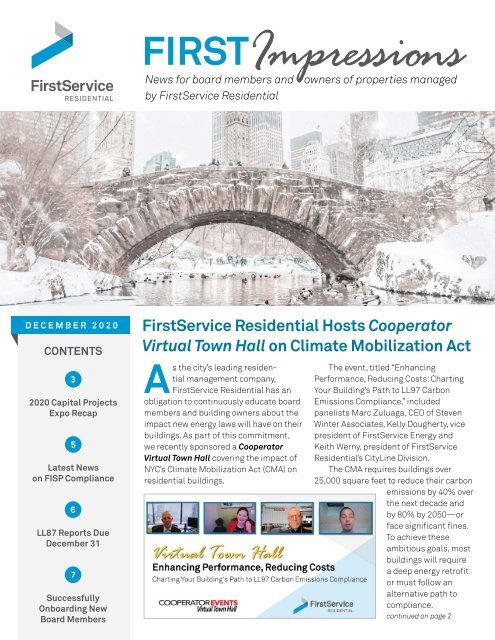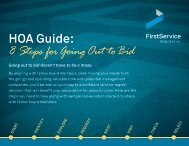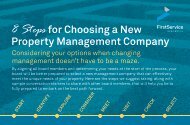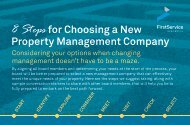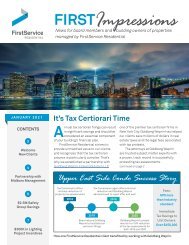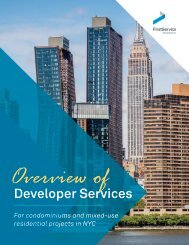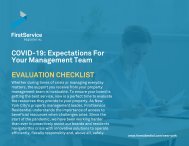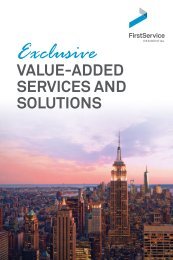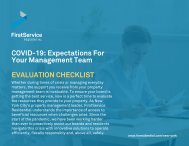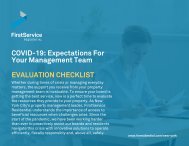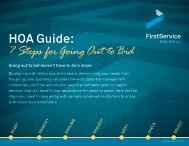FSR First Impressions Dec20 Final Email
You also want an ePaper? Increase the reach of your titles
YUMPU automatically turns print PDFs into web optimized ePapers that Google loves.
FIRST<strong>Impressions</strong><br />
News for board members and owners of properties managed<br />
by <strong>First</strong>Service Residential<br />
DECEMBER 2020<br />
CONTENTS<br />
3<br />
2020 Capital Projects<br />
Expo Recap<br />
5<br />
Latest News<br />
on FISP Compliance<br />
6<br />
LL87 Reports Due<br />
December 31<br />
7<br />
Successfully<br />
Onboarding New<br />
Board Members<br />
<strong>First</strong>Service Residential Hosts Cooperator<br />
Virtual Town Hall on Climate Mobilization Act<br />
As the city’s leading residential<br />
management company,<br />
<strong>First</strong>Service Residential has an<br />
obligation to continuously educate board<br />
members and building owners about the<br />
impact new energy laws will have on their<br />
buildings. As part of this commitment,<br />
we recently sponsored a Cooperator<br />
Virtual Town Hall covering the impact of<br />
NYC’s Climate Mobilization Act (CMA) on<br />
residential buildings.<br />
The event, titled “Enhancing<br />
Performance, Reducing Costs: Charting<br />
Your Building’s Path to LL97 Carbon<br />
Emissions Compliance,” included<br />
panelists Marc Zuluaga, CEO of Steven<br />
Winter Associates, Kelly Dougherty, vice<br />
president of <strong>First</strong>Service Energy and<br />
Keith Werny, president of <strong>First</strong>Service<br />
Residential’s CityLine Division.<br />
The CMA requires buildings over<br />
25,000 square feet to reduce their carbon<br />
emissions by 40% over<br />
the next decade and<br />
by 80% by 2050—or<br />
face significant fines.<br />
To achieve these<br />
ambitious goals, most<br />
buildings will require<br />
a deep energy retrofit<br />
or must follow an<br />
alternative path to<br />
compliance.<br />
continued on page 2
2<br />
AS FEATURED IN THE NEW YORK TIMES<br />
<strong>First</strong>Service Residential President Dan Wurtzel<br />
recently provided commentary in The New York<br />
Times’ “Ask Real Estate” column on tipping building<br />
staff during this complicated holiday season.<br />
CMA Town Hall continued from front page<br />
<strong>First</strong>Service Residential understands the<br />
difficultly our clients may face in successfully<br />
navigating this costly, complex and potentially<br />
disruptive process. Our goal is to continue to share<br />
best practices and guidance that will help board<br />
members and building owners:<br />
• Identify and prioritize operational improvements<br />
and potential upgrades that can<br />
reduce emissions<br />
• Enhance building energy performance<br />
• Reduce energy waste, costs and greenhouse<br />
gas emissions<br />
• Take advantage of current incentives<br />
• Improve quality of life for residents<br />
• Expertly plan the sequence of work to achieve<br />
maximum emissions reductions and cost<br />
savings, and<br />
• Comply with the law.<br />
Attendees submitted more than 80 questions<br />
during the event—a clear indication that Local Law<br />
97 compliance will continue to be a topic of great<br />
interest in 2021 and beyond.<br />
Click here to watch a recording of the<br />
discussion.<br />
HOW ARE BUILDING STAFF BONUSES<br />
BEING HANDLED THIS YEAR?<br />
Here are examples of what our property managers<br />
are seeing among boards and building owners<br />
across our portfolio of clients:<br />
• Some have been providing bonuses throughout<br />
the year and plan to issue an additional<br />
bonus for their service during the pandemic.<br />
• Others have chosen to only provide bonuses<br />
at the end of the year.<br />
• Many boards are continuing to provide<br />
COVID-19 stipends for travel and parking<br />
costs so employees can avoid mass transit.<br />
• Some boards have implemented a holiday<br />
assessment or created a holiday fund and<br />
will distribute the funds equally among<br />
the staff.<br />
FIRST<strong>Impressions</strong> · <strong>First</strong>Service Residential
BUILDING TO LAST<br />
A blueprint for managing capital projects to maximize value and comply with NYC laws<br />
CAPITAL PROJECTS 2020: EXPO RECAP<br />
To help our clients navigate all aspects of planning,<br />
executing and funding capital projects, <strong>First</strong>Service<br />
Residential partnered with our project management<br />
affiliate, <strong>First</strong>Service Project Management, to host the<br />
fourth annual Capital Improvements Expo: Building to<br />
Last. The virtual event gave board members access to a<br />
library of educational webinars, opportunities to engage<br />
with expert panelists in Q&A breakout sessions and direct<br />
access to vendors and technical service providers.<br />
In addition to the featured presentation, “Amenities<br />
and Living Spaces: Adapting and Planning for our New<br />
Reality,” the event included nine breakout sessions<br />
curated to address a range of topics. If you were unable<br />
to attend, we invite you to visit our Capital Improvements<br />
Resource Library to access the webinar recordings.<br />
3<br />
LENDING SOLUTIONS FOR CAPITAL PROJECTS<br />
Capital improvements are a fact of life for residential buildings. Many<br />
of our clients struggle with the complexity and costs associated with<br />
major upgrades, replacements and repairs. To help our clients identify<br />
the best available funding strategies for their buildings, <strong>First</strong>Service<br />
Residential has created Building to Last: A Blueprint for Success, a<br />
guide to capital improvement projects covering:<br />
• The relationship between capital improvements and preventive<br />
maintenance<br />
• Reserve funds, special assessments and loans<br />
• Key elements of a successful capital improvement plan<br />
If financing capital projects presents a challenge to your board, click<br />
here to read Capital Improvement Lending Solutions for Condominium<br />
and Co-op Boards, which includes expert solutions, client success<br />
stories and more from <strong>First</strong>Service Financial.<br />
<strong>First</strong>Service Residential · FIRST<strong>Impressions</strong>
ENERGYInsights<br />
Helping <strong>First</strong>Service Residential clients navigate the path to efficiency<br />
4<br />
<strong>First</strong>Service Residential and <strong>First</strong>Service<br />
Energy continue to help our clients<br />
understand their obligations under the<br />
Climate Mobilization Act (CMA), including<br />
navigating the new legislation, understanding<br />
forthcoming penalties related to carbon<br />
emissions, improving overall efficiency and<br />
preparing buildings to comply with the law.<br />
To further the dialogue, we have launched<br />
Energy Insights, an interactive library of<br />
webinars, articles, best practices and tools<br />
about energy efficiency and how <strong>First</strong>Service<br />
Energy can help our clients. Frequently<br />
updated content includes most recently our<br />
comprehensive NYC Climate Mobilization Act<br />
Frequently Asked Questions.<br />
With the right plan and the right partners,<br />
buildings can turn this obligation into an<br />
opportunity to save money, reduce emissions and<br />
improve quality of life for residents.<br />
To learn how <strong>First</strong>Service Energy can assist<br />
your building, please email info@firstserviceenergy.com.<br />
GIVING THANKS<br />
WE SALUTE OUR<br />
ESSENTIAL WORKERS<br />
<strong>First</strong>Service Residential salutes our<br />
essential workers—resident managers,<br />
superintendents, doormen, front desk<br />
employees, porters, maintenance workers<br />
and our own associates—who have continued<br />
to deliver exceptional service to our clients<br />
during these most unprecedented of times.<br />
From maintaining proper safety protocols to<br />
adapting to ever-changing COVID-19 practices<br />
to finding innovative ways to continue to<br />
deliver essential services to our residents, we<br />
could not have come this far without you.<br />
We will continue to get through<br />
this together.<br />
FIRST<strong>Impressions</strong> · <strong>First</strong>Service Residential
LATEST NEWS ON FISP COMPLIANCE<br />
New York City’s Facade Inspection Safety<br />
Program, known as FISP or Local Law 11,<br />
requires periodic facade inspections for buildings<br />
with more than six stories above ground. This<br />
requirement also includes appurtenant structures<br />
such as a garage, balcony railings or street walls. The<br />
burden of responsibility falls on boards and building<br />
owners to complete these inspections every five<br />
years, file subsequent reports with the Department<br />
of Buildings (DOB) and complete all remedial repairs<br />
within a specific timeframe. The current inspection<br />
timetable is Cycle 9 which opened on February 21,<br />
2020. The best way to comply with new FISP requirements<br />
is to plan ahead.<br />
WHAT ARE THE NEW FISP/LOCAL LAW 11<br />
REQUIREMENTS FOR CYCLE 9?<br />
1. Physical inspections must now be performed<br />
every 60 linear feet along a building’s<br />
facade.<br />
2. The increased linear requirement often<br />
means buildings will need to install more<br />
scaffold than before which increases project<br />
expenses.<br />
3. Inspectors are required to probe or remove<br />
small portions of cavity walls for a more<br />
in-depth structural analysis.<br />
4. When the report is filed with the DOB,<br />
buildings are required to post an exterior<br />
wall certificate similar to restaurant grading<br />
and building energy efficiency scores.<br />
5. Failure to post the certificate within 30 days<br />
of report filing will result in a $500 violation<br />
which can be given every time the DOB visits<br />
a property, even for reasons unrelated to the<br />
facade inspection.<br />
To learn more about FISP, read our article or<br />
watch our webinar which cover:<br />
• Newly amended rules<br />
• “Safe,” “Unsafe” and “SWARMP” conditions<br />
• Working with QEWI architects and engineers<br />
to meet deadlines or file extensions<br />
• Potential fines and penalties<br />
• Requirement to correct “Unsafe” conditions<br />
• 90-day DOB extensions to complete repairs<br />
With this information, you will be able to intelligently<br />
discuss the compliance requirements for<br />
your building with your architect/engineer.<br />
5<br />
LL11 COMPLIANCE DEADLINES<br />
Last Digit<br />
of Block Number<br />
4, 5, 6, 9<br />
0, 7, 8<br />
1, 2, 3<br />
2020 2021 2022 2023 2024<br />
SUB-CYCLE 9A<br />
1/21/20 - 1/21/22<br />
SUB-CYCLE 9B<br />
1/21/21 - 1/21/23<br />
SUB-CYCLE 9C<br />
1/21/22 - 1/21/24<br />
<strong>First</strong>Service Residential · FIRST<strong>Impressions</strong>
LOCAL LAW 87 REPORTS DUE DECEMBER 31<br />
Upcoming 2020 energy ordinance compliance deadlines<br />
6<br />
NYC Local Law 87 (LL87) requires buildings<br />
over 50,000 sq ft to undergo periodic<br />
energy audit and retro-commissioning<br />
measures. The intent of the law is to inform building<br />
owners of their energy consumption through<br />
energy audits, which are surveys and analyses of<br />
energy use, and retro-commissioning, the process<br />
of ensuring correct equipment installation and<br />
performance.<br />
<strong>First</strong>Service Energy provides expert guidance<br />
on completing the energy audit and retro-commissioning<br />
services needed to comply with LL87—a<br />
complex and potentially costly law. Through our<br />
partnerships, <strong>First</strong>Service Residential clients pay<br />
20% less for LL87 services.<br />
Here’s how it works:<br />
1. Two years prior to your building’s compliance<br />
deadline, our team will reach out to<br />
collect and verify your building typology.<br />
2. Using this data, we solicit bids from our<br />
network of qualified service providers.<br />
3. Our team reviews the proposals and prepares<br />
a bid analysis for your building.<br />
Our goal is to lessen the administrative burden<br />
on your property manager so that he or she can<br />
focus on other priorities for your building.<br />
LL87 COMPLIANCE DEADLINES<br />
Covered buildings are due in the calendar year<br />
with a final digit that is the same as the last digit<br />
of the building’s tax block number, as illustrated in<br />
this chart. The building’s energy audit and retro-commissioning<br />
work must be completed prior to<br />
filing the energy efficiency report (EER).<br />
If your building is unable to file the EER by<br />
December 31, 2020, we can assist with obtaining<br />
an extension for your building if it meets the<br />
extension criteria:<br />
• Good Faith Efforts: An owner may apply for an<br />
extension of time to file an EER if, despite good<br />
faith efforts, the owner is unable to complete<br />
the required energy audit and retro-commissioning<br />
prior to the due date of the report, for<br />
reasons other than financial hardship of the<br />
building.<br />
or<br />
• Financial Hardship: An owner may apply for<br />
annual extensions of time to file an EER based<br />
on the financial hardship of the building.<br />
If an extension request is successfully filed by<br />
Dec. 31, 2020, the EER submission due date will<br />
extend to Dec. 31, 2021.<br />
For questions, contact Lily Malota at<br />
<strong>First</strong>Service Energy.<br />
LL87 COMPLIANCE DEADLINES<br />
Year EER is due 2013 2014 2015 2016 2017 2018 2019 2020 2021 2022<br />
Last digit of tax block number 3 4 5 6 7 8 9 0 1 2<br />
FIRST<strong>Impressions</strong> · <strong>First</strong>Service Residential
NEW TO YOUR BOARD?<br />
Our best practices guide to onboarding new board members can help<br />
New board members can be full of fresh ideas and<br />
perspectives, but in order for a board to be successful,<br />
all members must be well-versed in their roles and<br />
responsibilities.<br />
To help, we have created a best practices guide to<br />
assist new board members with transition and acclimation<br />
into their new role.<br />
Thank you for volunteering to make a difference<br />
for your building and fellow residents.<br />
Click here to read our guide to successfully<br />
onboarding new board members.<br />
LOCAL LAW 152 COMPLIANCE<br />
NYC Local Law 152 requires periodic inspection<br />
of gas piping systems by a licensed<br />
master plumber (LMP) or other qualified<br />
provider at least once every four years according<br />
to the schedule set out in 1 RCNY §103-10. Owners<br />
of all buildings—excluding those in occupancy<br />
group R-3 (2 families or less)—must comply. The<br />
law, which became effective on January 1, 2020,<br />
impacts an estimated 280,000 buildings.<br />
The city defines building gas piping systems as<br />
all exposed gas piping from point of entry into the<br />
building. This includes building services meters and<br />
all gas piping in public spaces, hallways, corridors,<br />
boiler rooms and mechanical spaces. This does not<br />
include gas piping within apartments.<br />
If an inspection reveals any unsafe or hazardous<br />
condition(s), the LMP must immediately notify<br />
the building owner, the utility providing gas service<br />
to the building, and DOB. The building owner must<br />
take immediate action to correct the condition(s) in<br />
compliance with NYC Construction Codes and any<br />
required permits.<br />
Failure to file an Inspection Certification before<br />
the applicable due date may result in a civil penalty<br />
of $10,000.<br />
UPCOMING INSPECTION CYCLES<br />
The rules implementing LL152 breakdown the<br />
inspection cycle by community districts:<br />
DATE RANGE FOR INSPECTION BUILDINGS<br />
IN COMMUNITY DISTRICTS<br />
Jan 1 –<br />
Dec 31, 2020<br />
Extended until June 30, 2021<br />
Jan 1 –<br />
Dec 31, 2021<br />
Jan 1 –<br />
Dec 31, 2022<br />
Jan 1 –<br />
Dec 31, 2023<br />
Districts: 1, 3 and 10<br />
in all boroughs<br />
Districts: 2, 5, 7, 13, and 18<br />
in all boroughs<br />
Districts: 4, 6, 8, 9, and 16<br />
in all boroughs<br />
Districts: 11, 12, 14, 15, and 17<br />
in all boroughs<br />
Subsequent inspections must be completed<br />
no later than Dec 31 within every fourth<br />
calendar year thereafter.<br />
7<br />
<strong>First</strong>Service Residential · FIRST<strong>Impressions</strong>
PROTECTING OUR CLIENTS:<br />
VIVE VENDOR COMPLIANCE<br />
<strong>First</strong>Service Residential is now working with<br />
third-party compliance service, Vendor<br />
Information Verification Experts (VIVE),<br />
to streamline the vendor screening process for<br />
our clients. VIVE independently qualifies service<br />
providers working at our properties by screening<br />
for valid trade licenses, confirming adequate and<br />
current insurance, performing general business<br />
background screening and requiring acceptance<br />
of our code of conduct.<br />
VIVE reviews the full general liability and<br />
umbrella liability policies. All contractors and<br />
suppliers are treated in the same manner, creating<br />
a fair and level playing field to work and bid<br />
on projects.<br />
Webinar<br />
Risk Management – An Everyday Necessity<br />
Click here to watch “Risk Management: An Everyday Necessity”<br />
with panelists Dan Wurtzel, president, <strong>First</strong>Service Residential,<br />
Ben Kirschenbaum, vice president and general counsel,<br />
<strong>First</strong>Service Residential, and Joe Bushey, president, VIVE.<br />
8<br />
Happy<br />
Holidays<br />
from your property management partners<br />
at <strong>First</strong>Service Residential!<br />
STAY CONNECTED<br />
<strong>First</strong><strong>Impressions</strong> is published for board members and owners of properties managed by <strong>First</strong>Service Residential. While every<br />
effort is made to achieve accuracy in the information contained in this publication, it is not intended as advice to any specific<br />
property, and <strong>First</strong>Service Residential shall not be liable for any damages resulting from reliance on the accuracy of information<br />
contained herein. The information contained herein is meant to provide general advice, and it is not intended to be applied to a<br />
specific building or situation experienced at a building. Please consult with your property manager and other professionals to<br />
address any compliance matter at your building.<br />
Have a comment about this newsletter?<br />
<strong>Email</strong> us at news.ny@fsresidential.com.<br />
FIRST<strong>Impressions</strong> · <strong>First</strong>Service Residential


